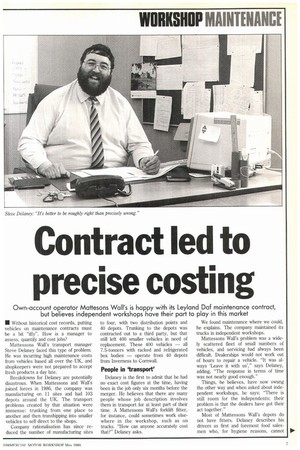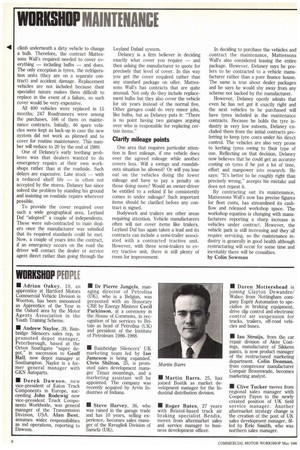Contract led to precise costing
Page 119

Page 120

If you've noticed an error in this article please click here to report it so we can fix it.
Own-account operator Mattesons Wall's is happy with its Leyland Daf maintenance contract, but believes independent workshops have their part to play in this market
• Without historical cost records, putting vehicles on maintenance contracts must be a bit "iffy". How is a manager to assess, quantify and cost jobs?
Mattessons Wall's transport manager Steve Delaney faced this type of problem. He was incurring high maintenance costs from vehicles based all over the UK, and shopkeepers were not prepared to accept fresh products a day late.
Breakdowns for Delaney are potentially disastrous. When Mattessons and Wall's joined forces in 1986, the company was manufacturing on 11 sites and had 103 depots around the UK. The transport problems created by that situation were immense: trunking from one place to another and then transhipping into smaller vehicles to sell direct to the shops.
Company rationalisation has since reduced the number of manufacturing sites to four, with two distribution points and 40 depots. Trurtking to the depots was contracted out to a third party, but that still left 400 smaller vehicles in need of replacement. These 400 vehicles — all 7.5-tonners with racked and refrigerated box bodies — operate from 40 depots from Inverness to Cornwall.
People in 'transport'
Delaney is the first to admit that he had no exact cost figures at the time, having been in the job only six months before the merger. He believes that there are many people whose job description involves them in transport for at least part of their time. A Mattessons Wall's forklift fitter, for instance, could sometimes work elsewhere in the workshop, such as on trucks. "How can anyone accurately cost that?" Delaney asks. We found maintenance where we could, he explains. The company maintained its trucks in independent workshops.
Mattessons Wall's problem was a widely scattered fleet of small numbers of vehicles, and servicing had always been difficult. Dealerships would not work out of hours to repair a vehicle. "It was always 'Leave it with us'," says Delaney, adding, "The response in terms of time was not nearly good enough."
Things, he believes, have now swung the other way and when asked about independent workshops, he says: "There is still room for the independents; their problem is that the dealers have got their act together."
Most of Mattessons Wall's depots do not have fitters. Delaney describes his drivers as first and foremost food salesmen who, for hygiene reasons, cannot climb underneath a dirty vehicle to change a bulb. Therefore, the contract Mattessons Wall's required needed to cover everything — including bulbs — and does. The only exception is tyres, the refrigeration units (they are on a separate contract) and accident damage. Replacement vehicles are not included because their specialist nature makes them difficult to replace in the event of a failure, so such cover would be very expensive.
All 400 vehicles were replaced in 15 months; 247 Roadrunners were among the purchases, 166 of them on maintenance contracts. Initially, 46 spare vehicles were kept as back-up in case the new system did not work as planned and to cover for routine maintenance. This number will reduce to 20 by the end of 1989.
One of Delaney's early teething problems was that dealers wanted to do emergency repairs at their own workshops rather than at the roadside. Such delays are expensive. Late stock — with a reduced shelf life — is often not accepted by the stores. Delaney has since solved the problem by standing his ground and insisting on roadside repairs wherever possible.
To provide the cover required over such a wide geographical area, Leyland Daf "adopted" a couple of independents. These were sub-contracted to main dealers once the manufacturer was satisfied that its required standards could be met. Now, a couple of years into the contract, if an emergency occurs on the road the driver will contact the dealer or service agent direct rather than going through the Leyland Dafaid system.
Delaney is a firm believer in deciding exactly what cover you require — and then asking the manufacturer to quote for precisely that level of cover. In this way you get the cover required rather than any standard package on offer. Mattessons Wall's has contracts that are quite unusual. Not only do they include replacement bulbs but they also cover the vehicle for six years instead of the normal five. Other garages could do very minor jobs, like bulbs, but as Delaney puts it: "There is no point having two garages arguing over who is responsible for replacing certain items."
Clarify mileage points
One area that requires particular attention is fleet mileage, if one vehicle does over the agreed mileage while another covers less. Will a swings and roundabouts situation be allowed? Or will you lose out on the vehicles doing the lower mileage and have to pay a penalty on those doing more? Would an owner-driver be entitled to a refund if he consistently comes in under mileage? Such important items should be clarified before any contract is signed.
Bodywork and trailers are other areas requiring attention. Vehicle manufacturers often will not cover items like trailers. Leyland Daf has again taken a lead and its contracts can include a semi-trailer associated with a contracted tractive unit. However, with three semi-trailers to every tractive unit, there is still plenty of room for improvement. In deciding to purchase the vehicles and contract the maintenance, Mattessons Wall's also considered leasing the entire package. However, Delaney says he prefers to be contracted to a vehicle manufacturer rather than a pure finance house. The same is true about dealer packages and he says he would shy away from any scheme not backed by the manufacturer.
However, Delaney openly admits that even he has not got it exactly right and the next vehicles to be purchased will have tyres included in the maintenance contracts. Because he holds the tyre industry in very low esteem, Delaney excluded them from the initial contracts preferring to keep tyre costs under his direct control. The vehicles are also very prone to kerbing tyres owing to their type of use. Reflecting on that decision, Delaney now believes that he could get an accurate costing on tyres if he put a lot of time, effort and manpower into research. He says: "It's better to be roughly right than precisely wrong," accepts his mistake and does not repeat it.
By contracting out its maintenance, Mattessons Wall's now has precise figures for fleet costs, has streamlined its cashflow and released workshop space. The workshop equation is changing with manufacturers reporting a sharp increase in vehicles under contract. However, the vehicle park is still increasing and they all require servicing, so the maintenance industry is generally in good health although restructuring will occur for some time and inevitably there will be casualties.
by Colin Sowman




















































































































































